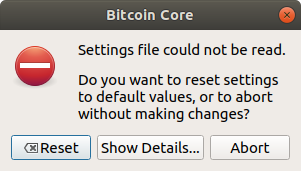This was reported to me by someone who had a crash issue after the disk was full, ostensibly unable to write settings.json and ending up with a truncated file. The solution was obvious in retrospect: delete it. But not everyone is going to figure this out by themselves.
Should this error be fatal at all? Could it be ignored and logged? Or is a warning then deleting it better (at least in the GUI, that’s harder to do for the daemon).
Another thing to look into might be to write the file atomically so that this doesn’t occur.
